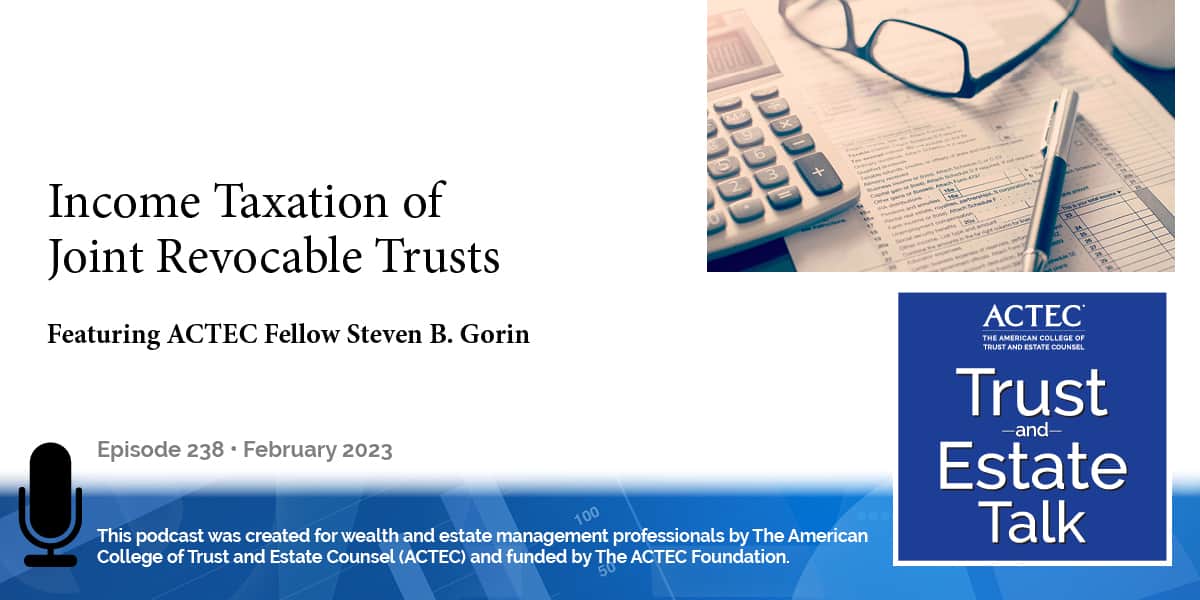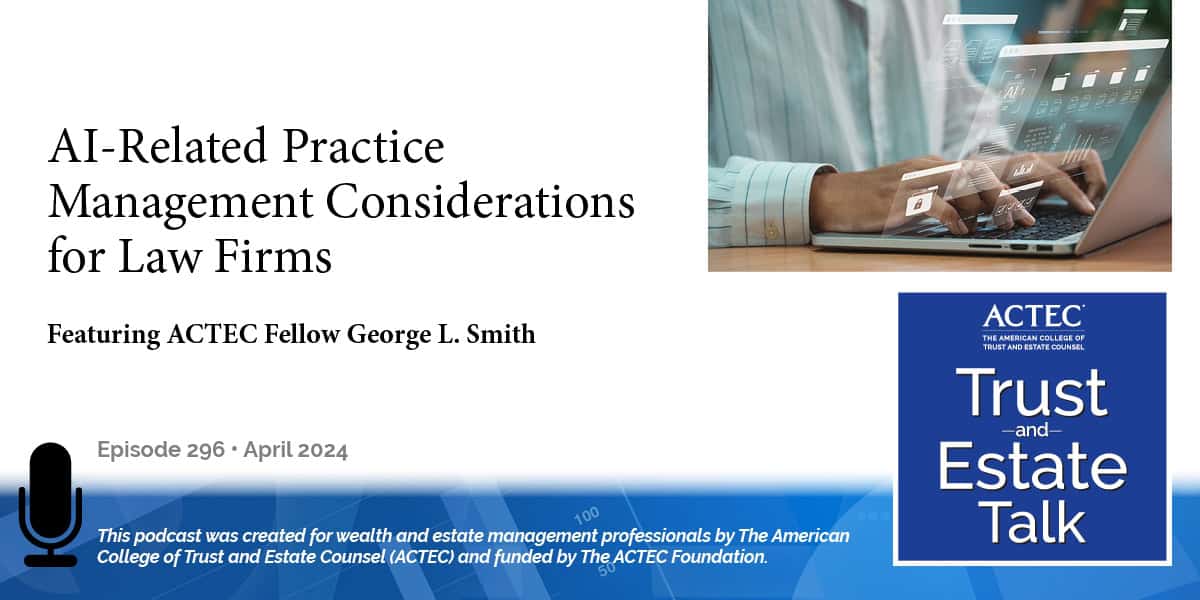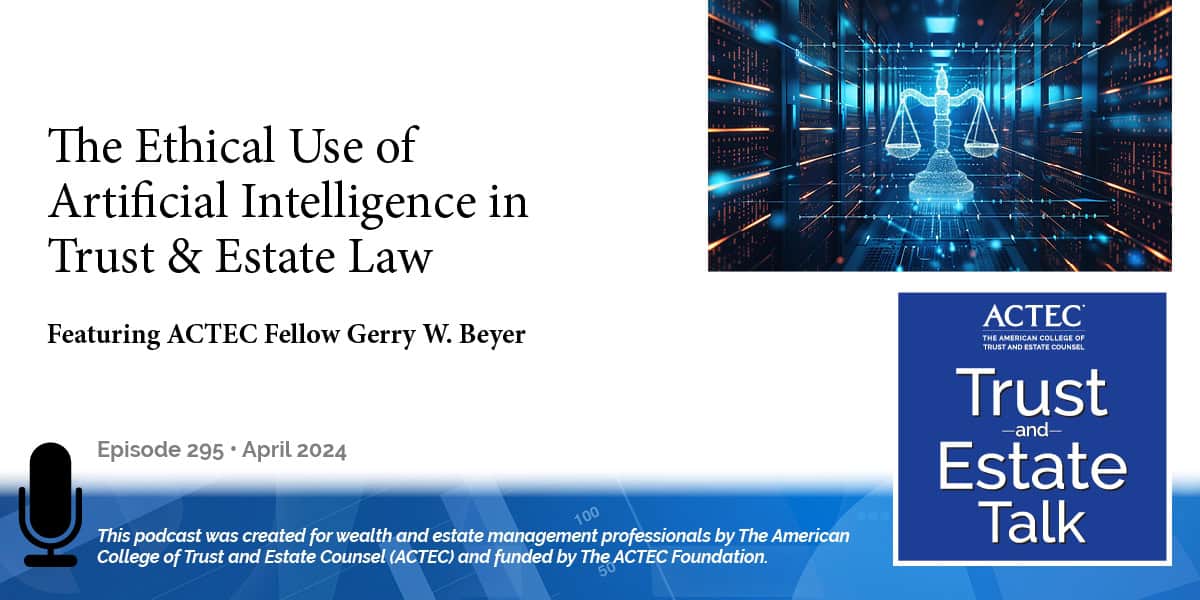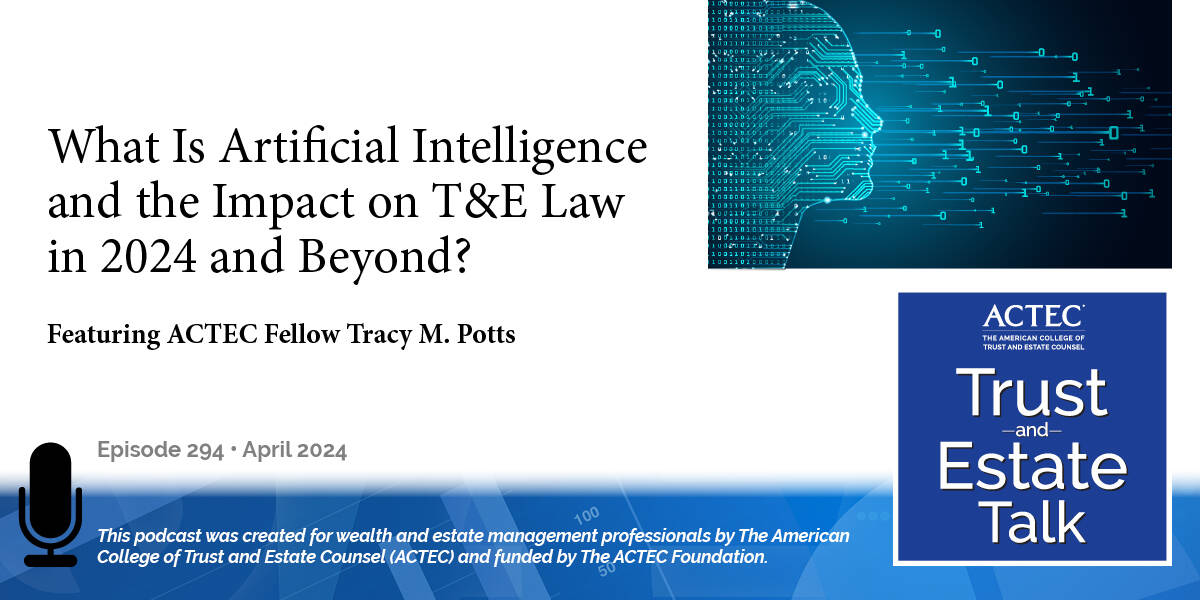Income Taxation of Joint Revocable Trusts

“Income Taxation of Joint Revocable Trusts,” That’s the subject of today’s ACTEC Trust and Estate Talk.
Transcript/Show Notes
This is Doug Stanley, ACTEC Fellow from St. Louis, Missouri. Joint revocable trusts have simplified income taxation in many respects while both grantors are living. When one spouse dies, complexity arises unless the surviving spouse can revoke both halves of the revocable trust. ACTEC Fellow Steve Gorin, also from St. Louis, will tell us more. Welcome, Steve.
Steve: Thank you very much, Doug. It’s a pleasure to be here. So, we’ll talk about joint revocable trusts. So, of course, as you know, a revocable trust is a trust that a person can change, amend, revoke, totally control however they want, and it’s just an estate planning substitute for a will so that you can avoid probate. So, in most states, we’re used to having each spouse in the marriage have his or her own revocable trust. And that simplifies things, but a lot of married couples are uncomfortable with dividing up their assets and saying “this is the first spouse, this is the second spouse, etc.” And so, a lot of spouses like to keep them in joint names.
Joint Revocable Trusts: Asset Protections
And, in some states, like our home state of Missouri, you can have special asset protection if you have the spouses keep their assets in both names in a revocable trust. In a lot of other states, you can hold assets as community property. And that’s typically the ones that used to be owned by Spain or Mexico that now became part of the U.S. many years ago. There’s a variety of other states that are not in that area who have adopted this community property status, and in a community property state, basically, each spouse owns the property half and half. But, you usually will set these up as a revocable trust where each spouse is the deemed owner of half of it.
So, a revocable trust is a grantor trust, meaning that you can use the grantor’s social security number. The “grantor” being the person who puts the assets into the trust. Now, when you have a joint revocable trust, regulations allow you to use either spouse’s social security number as long as you’re filing a joint tax return. And joint tax returns do tend to save income taxes, that’s what most spouses do. So, you may have people with community property joint revocable trusts, or you may have people in a common law state that decided they just want to pool their assets in one joint revocable trust just to try to keep things all together and loving family-like.
And then – and again, if they just file the joint returns – they can just use their own social security numbers, and they go along merrily without any income tax complications whatsoever. However, when one spouse dies, and if this property was owned half and half, what happens is you have one-half of the property kind of belonged to the decedent, and, even though it was in a revocable trust, it was really the decedent’s half the decedent was considered to put into that trust. And then you have the other half that the surviving spouse tends to hold. They just keep it as their own revocable trust.
When a Revocable Trust Becomes an Irrevocable Trust
So, you have these two halves now, and the grantor trust rules will see the person as the deemed owner of the trust only if they put the money into the trust themselves. And so, what will happen is the surviving spouse, when they can continue to revoke their half, they get to continue to use their social security number for that half of the trust. But the decedent’s half has the decedent as the grantor and it doesn’t matter what kind of grantor trust powers are in there, the decedent is no longer living, so the decedent is not a taxpayer anymore.
If the decedent’s estate, who could be the taxpayer or in this case, when you have a revocable trust, that one-half of the trust is no longer revocable. So, for that one-half, you have an irrevocable trust. And so, for an irrevocable trust, you’ve got to stop having grantor trust treatment. So, in many cases, you have a community property trust or this joint revocable trust, and the decedent died. So, post-mortem, you have one half is a non-grantor trust that has to pay its own taxes and file its own tax return. The other half is a grantor trust. Now, typically, what you’ll do for that, is you’ll get one tax ID that will receive all the 1099s and other tax reporting documents, and then the trust will file a single trust income tax return. And on that trust income tax return, it would show that one-half is deemed owned by the surviving spouse and reported solely to that surviving spouse. And then the other half just uses normal trust income taxation, which is beyond the scope of this podcast.
Now, if you want to try to keep things simpler for the surviving spouse and the surviving spouse doesn’t want to have to file a separate trust income tax return that has this 50/50 split going on with it, you could have an estate plan where the surviving spouse has the right to pull out the entire trust. Not just the half that the surviving spouse contributed but also the decedent one-half. So, in that case, you have two separate sets of rules that are applying. The surviving spouse’s half is taxed to the surviving spouse because the surviving spouse was the grantor and has the right to revoke that part.
IRS Code: Grantors and Others Treated as Substantial Owners
The half that came from the decedent, because the surviving spouse has the unlimited right to withdraw that amount, the surviving spouse is treated as the owner under a special rule. So, I’m going to just throw a few Code sections for those who really like those. So, Code Section 671 is what makes the grantor the deemed owner. Code Sections 672 to 677 talk about different rules and when and what powers the grantor has to have, or what other types of features they have to have in the trust for the grantor to be the deemed owner. So, 672 through 677 are basically the powers that can cause grantor trust status to occur, but 671 is what causes the grantor to be taxed when those 673 to 677 powers exist.
There’s another provision, Code Section 678, that says if the grantor is not the deemed owner of the trust, and the beneficiary has the right to withdraw what’s in the trust, then the beneficiary becomes the deemed owner. And you’re not looking to 671, or 673, or 677; you’re looking at 678 itself. So, if you have the surviving spouse able to withdraw the entire half as a beneficiary through this joint revocable trust mechanism, where the joint revocable trust survives until the surviving spouse is dead, then you can have both halves of it be taxed just like it was a revocable trust of the surviving spouse and use the surviving spouse’s social security number.
Concluding Thoughts
Now, there are some people who are a little bit confused by these rules. They don’t understand that you have to have 671 apply normally to have a grantor be the deemed owner. And there are some people who say that when the first spouse dies, and the surviving spouse has a bunch of powers, but the surviving spouse does not have the right to withdraw it, they try to say that that is all taxed to the surviving spouse. And they are dead wrong about that. And, so, don’t rely on any of that. The surviving spouse has to have the right to withdraw both halves of the trust in order to be able to use the surviving spouse’s social security number.
So, this kind of arrangement is not good for estate tax planning, but it can be a terrific solution for people who have estates where the combined estate is going to be much less than the federal and any state estate tax exemptions. So, I hope you found this helpful and look forward to future contact with you. Thank you.
Doug: Thank you, Steve, for providing your expertise.
You may also be interested in:
This podcast was produced by The American College of Trust and Estate Counsel, ACTEC. Listeners, including professionals, should under no circumstances rely upon this information as a substitute for their own research or for obtaining specific legal or tax advice from their own counsel. The material in this podcast is for information purposes only and is not intended to and should not be treated as legal advice or tax advice. The views expressed are those of speakers as of the date noted and not necessarily those of ACTEC or any speaker’s employer or firm. The information, opinions, and recommendations presented in this Podcast are for general information only and any reliance on the information provided in this Podcast is done at your own risk. The entire contents and design of this Podcast, are the property of ACTEC, or used by ACTEC with permission, and are protected under U.S. and international copyright and trademark laws. Except as otherwise provided herein, users of this Podcast may save and use information contained in the Podcast only for personal or other non-commercial, educational purposes. No other use, including, without limitation, reproduction, retransmission or editing, of this Podcast may be made without the prior written permission of The American College of Trust and Estate Counsel.
If you have ideas for a future ACTEC Trust & Estate Talk topic, please contact us at ACTECpodcast@ACTEC.org.
© 2018 – 2024 The American College of Trust and Estate Counsel. All rights reserved.
Latest ACTEC Trust and Estate Talk Podcasts

AI-Related Practice Management Considerations for Law Firms
A discussion for law firms about how to incorporate AI in their practice management, including staff considerations, the “billable hour,” and more.

The Ethical Use of Artificial Intelligence in Trust & Estate Law
A law professor offers insights into the risks, rewards, duties and ethical considerations of lawyers using AI in their T&E practices.

What Is Artificial Intelligence and the Impact on T&E Law in 2024 and Beyond?
A primer on the types and uses of AI, then a deeper dive into the impact on trust and estate law from types to applications to ethical considerations.

